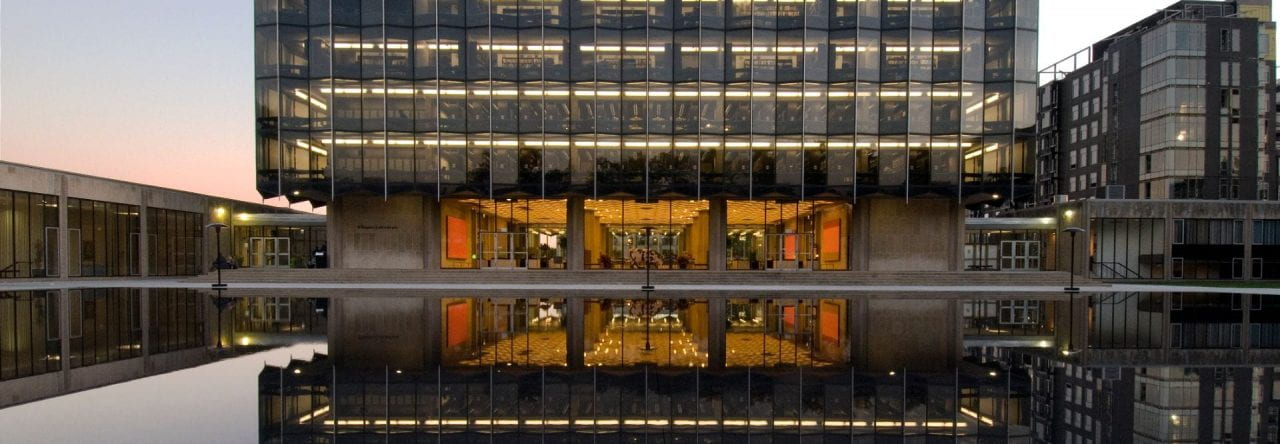 Christy Crouse, ’21, has been passionate about serving others since childhood.
Christy Crouse, ’21, has been passionate about serving others since childhood.
By Hunter Hovenga, ’21
Service to others has provided a foundational source of meaning for Christy Crouse since day one.
Crouse, ’21, developed an acute sense of empathy at a young age. This would later become a motivational force, leading her through a vast range of service experiences up to and throughout her time at the law school.
Crouse attributes her drive to help others to her early life in the Dominican Republic, where she lived until she was eight years old. Raised by parents working for service organizations, Crouse notes her tailwinds originate in an upbringing that instilled in her the maxim that “life doesn’t mean much if you aren’t giving back and supporting the people around you.”
Before law school, Crouse—fluent in Spanish and conversational in Mandarin and French—cultivated her passion for international human rights and immigration through work and service spanning numerous government and nonprofit organizations. Most notably, she taught English as a Fulbright Scholar in Tunja, Colombia and worked for the U.S. Embassy in Nepal.
Crouse’s commitment to volunteerism had only intensified by the time she arrived at the University of Chicago Law School.
Crouse hit the ground running her 1L year as a volunteer for the Chinatown Pro Bono Legal Clinic, where she would spend Saturdays assisting Chinese-speaking clients with their legal needs and conducting legal research for volunteer attorneys. This program operated through the Chinese American Service League.
For her 1L spring break, Crouse and the Immigration Law Society helped organize a pro bono trip to a detention center for women and children in Dilley, Texas. Partnering with the School of Social Service Administration, Crouse spent her break alongside volunteer attorneys, law students, and social work students providing asylum counseling and informing detainees of their legal rights.
“I really care about people who are struggling and trying to adapt to a new place, especially a new country. It’s not easy and if there’s anything I can do to make it easier, I want to help.”
Crouse brought her passion for serving the underrepresented to two internships in a split summer after 1L.
At the Center for Human Rights and Global Justice, she conducted research evaluating the capacity of a local immigrant legal services organization and created actionable recommendations for how it could improve its efficacy. For Crouse, the experience compelled a realization that “there simply are not enough lawyers to do all of the necessary work to help people.” She notes that the experience taught her the meaning of “legal empowerment,” which she describes as the process of “finding creative strategies to support regular people to help others with legal issues.” Towards that end, Crouse notes that the experience taught her that seemingly simple strategies, such as having someone accompany immigrants to court to observe proceedings and provide emotional support, can go a long way in producing positive outcomes.
Crouse spent the second half of her 1L summer at LatinoJustice PRLDEF (Puerto Rican Legal Defense Fund). She researched and analyzed legal questions surrounding immigrants’ civil rights, including assisting with amici curiae for the DACA case before the US Supreme Court and a class action case concerning driver’s licenses for undocumented persons.
Crouse has also made significant contributions to the law school pro bono community through her involvement in multiple student organizations.
As a Committee Chair of the Law Students Association’s Diversity and Inclusion Committee, Crouse played an integral role in organizing the inaugural Impact Initiative Dinner. In an effort spanning “a year of intense work and planning,” she helped bring together twenty-five South Side community organizations and speakers to attend a dinner to “connect with students, talk about issues of race and inequality, and discuss how we can be better neighbors to the South Side.” She emphasizes that she and her peers are just getting started, with plans to organize a bias training to help students enter and exit communities responsibly, which they hope will open up channels for students to partner with South Side community groups and participate in events.
As President of the Immigration Law Society, Crouse organized a group of students to attend a training with the Instituto del Progreso Latino, where the students learned how to assist individuals with the U.S. naturalization process. She also serves as the Vice President of the Human Rights Law Society, where she assists with communications and organizes lunch talks.
Crouse is also active in the International Human Rights Clinic, where she is currently researching migrant pay gaps overseas for the International Labor Organization. She has already dedicated this year’s Spring Break to conducting fact-finding in Spain and interviewing migrants, policymakers, and employers.
Crouse has no plans to slow down on pro bono and public service moving forward into 3L and beyond. She will be spending half of this upcoming summer working for a public interest organization in Colombia and she hopes to work for an immigration or international human rights organization in Latin America after law school.
